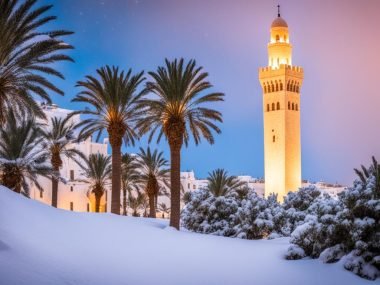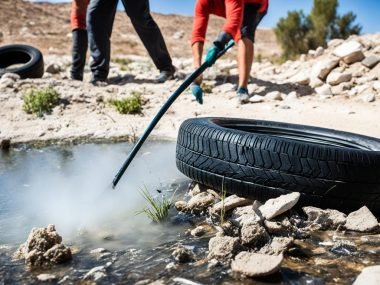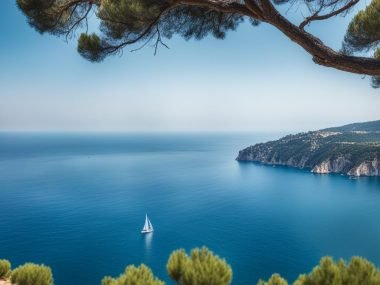Tunisia’s literacy rate is over 81% while Nigeria’s is about 62%. This starts our deep look into Tunisia vs Nigeria. We’ll look at what makes these countries different.
We will compare lots of things like places, how well people live, and history. We’ll also look at how they are run, their buildings, and their cultures. We want to see if Tunisia is doing better than Nigeria.
Key Takeaways
- Tunisia has a way higher literacy rate than Nigeria.
- Both places have different weather. Tunisia is by the sea and Nigeria is tropical.
- Tunisia’s people earn more but more people have jobs in Nigeria.
- Tunisia has more beds in hospitals, so their healthcare might be better.
- Both countries have their own history and ways of running things.
- Nigeria has bigger transport networks, but Tunisia is better with digital tech.
Geographical Comparison: Tunisia vs Nigeria
Looking at Tunisia and Nigeria, their sizes and people numbers stand out. Let’s explore their geographical sizes.
Land Area and Population Density
Tunisia covers about 155,360 square kilometres. It’s much smaller than Nigeria’s huge 923,770 square kilometres. This makes Tunisia look tiny next to Nigeria.
Nigeria has a big population of 218.54 million people. Tunisia has 12.35 million people. This shows Nigeria’s population density is higher.
Climate and Natural Landscapes
The weather in Tunisia and Nigeria is quite different. Tunisia has a Mediterranean climate with warm summers and mild winters. Nigeria has a tropical climate with wet and dry seasons.
These climates shape their natural beauties.
Urban vs Rural Distribution
In Tunisia, more people live near the coast, in cities. But in Nigeria, people live in big cities and the countryside. This shows how differently they use their lands.
| Aspect | Tunisia | Nigeria |
|---|---|---|
| Land Area (sq km) | 155,360 | 923,770 |
| Population | 12.35 million | 218.54 million |
| Population Density (people per sq km) | 79.5 | 236.4 |
| Climate | Mediterranean | Tropical |
| Urban vs Rural Distribution | More urban, coastal cities | Mix of mega-cities and rural areas |
Economic Overview: Tunisia Economy vs Nigeria
We will look at Tunisia’s economy compared to Nigeria’s. We check things like GDP per capita, inflation, and jobs. We also see what the government does about money.
GDP Per Capita
The Nigeria GDP per capita is $2,160. It shows how their economy is doing. On the other hand, Tunisia’s GDP per capita is $3,830. This shows Tunisia has a stronger economy than Nigeria. The difference highlights how these countries are doing economically.
Inflation and Unemployment Rates
Nigeria’s inflation is very high at 18.85%. Tunisia has a lower inflation rate of 8.31%. This shows how each country is dealing with its economy. Nigeria’s jobless rate is quite low at 3.6%. But, Tunisia’s jobless rate is 17.7%. This is a big problem for Tunisia’s workforce.
Government Debt and Fiscal Policies
Looking at government debt and money plans shows differences. Nigeria’s debt is 34.93% of its GDP. Tunisia’s debt is much higher, at 79.36% of GDP. This shows they face different money challenges.
The economic gap between Tunisia and Nigeria is clear. It shapes their journey to financial health and growth. Looking at things like the Tunisia unemployment rate and the Nigeria GDP per capita helps us understand their economies better.
Quality of Life: Which is Better, Tunisia or Nigeria?
Looking at life in Tunisia and Nigeria, we see big differences. These include life span, health care, schooling, literacy, and politics.

Life Expectancy and Healthcare
In Tunisia vs Nigeria, people live longer in Tunisia. Men reach 75 and women 77. In Nigeria, it’s much lower, with men at 52 and women at 53. This shows Tunisia has better health care and more resources.
Tunisia also has more hospital beds. They have 2.18 per 1000 people. Nigeria has only 0.5. This is another sign of better health services in Tunisia.
Education and Literacy Rates
Tunisia leads over Nigeria in schooling and reading skills. They have a higher literacy rate. This is because they have better schools and universities.
This helps make life better in Tunisia compared to Nigeria.
Safety and Political Stability
The political climate affects life quality in Tunisia and Nigeria. Tunisia is more stable. This makes it a safer place for people to live.
Nigeria, however, has to deal with unrest and safety issues. This impacts the well-being of its people.
To sum up, Tunisia and Nigeria differ a lot in living standards. Looking at the Tunisia vs Nigeria human development index, these differences stand out. They show us how health, education, and safety vary between the two.
Historical Context and Governance
Studying Tunisia and Nigeria’s past helps us understand their governments today. We look at their colonial histories and how politics have changed. These changes have shaped their current rules and how people live.
Colonial Past and Path to Independence
Tunisia and Nigeria have different stories of becoming independent. Tunisia gained freedom from France in 1956. This started its path to governing itself. Nigeria got independence from Britain in 1960. Their colonial histories affect how they see themselves and govern.
Current Political Systems
Tunisia and Nigeria have different ways of running their countries today. Tunisia has a system where people vote and had a human rights leader, Moncef Marzouki, as president in 2011. Nigeria uses a system that deals with many local and ethnic groups. These systems show they have grown since becoming independent and try to meet their people’s needs.
Civil Rights and Freedoms
Tunisia is known for being forward-thinking about people’s rights, like women’s rights. The 2011 revolution made personal freedoms and democracy better. Nigeria works on making sure all its diverse groups have rights. Looking at Tunisia’s people and their histories can help understand these differences.
Infrastructure Comparison: Roadways and Technology
Tunisia and Nigeria show big differences in their infrastructures. Nigeria has a vast road network, covering 195,000 km. Meanwhile, Tunisia shines in railways and digital tech use.
Transportation Networks
In Nigeria, the roads are key for getting around its large area. Tunisia, though smaller, has a dense, well-linked network, especially in cities. Its railways are great for long travels and business.
Telecommunication and Internet Accessibility
Tunisia leads in internet access compared to Nigeria. It has more mobile subscriptions per person, showing strong mobile network infrastructure. Nigeria is growing but can still get better at this. Tunisia’s focus on digital tech for its people stands out.
Looking at Tunisia versus Nigeria, Nigeria’s roads are wider-reaching. But, Tunisia’s telecom and internet achievements are impressive.
Is Tunisia Better Than Nigeria? Social Aspects and Cultural Differences
Tunisia and Nigeria’s social structures are quite different. Tunisia has an Arabic culture that affects life there. This includes language, traditions, and religion. Nigeria, on the other hand, is very diverse. It has many ethnic groups and languages, like Hausa, Yoruba, and Igbo.
The cultural differences between Tunisia and Nigeria are clear in their religions. Tunisia mainly follows Islam. Most people there are Muslims. Nigeria has a mix of religions. People there follow Islam, Christianity, or indigenous beliefs. This mix makes Nigeria’s culture very rich.

Tunisia values family, community, and religion a lot. These shape how people act and interact. Nigeria’s values vary due to its many ethnicities and cultures. Family roles, community involvement, and traditions are diverse. They show the rich heritage of Nigeria.
Tunisia and Nigeria have unique identities. These come from their history and how their societies have evolved. The differences affect not just local communities. They also shape how the world sees these two countries.
“Both Tunisia and Nigeria exemplify the beauty of cultural diversity and the complexities of social structures in modern societies.”
| Aspect | Tunisia | Nigeria |
|---|---|---|
| Dominant Culture | Arabic | Multiple (Hausa, Yoruba, Igbo, etc.) |
| Languages | Arabic, French | English, Hausa, Yoruba, Igbo |
| Religions | Islam | Islam, Christianity, Indigenous Faiths |
| Family and Community Values | Strong Emphasis on Family and Community | Diverse Family and Community Dynamics |
Environmental and Agricultural Land
Let’s look at how Tunisia and Nigeria use their land for farming and the environment. Each country has its own way of doing things. These ways are key for their money-making and keeping nature safe.
Forest Coverage and Conservation Efforts
Keeping the environment safe is super important. Tunisia has about 6.6% of its land as forests. Nigeria has more, with 9.5%. Nigeria’s bigger forests help a lot with nature and the climate.
Conservation efforts in Tunisia are impressive. They help save the few forests and stop the land from turning into a desert. The Green Tunisia programme helps increase forests and makes people more aware of nature.
Agricultural Sector and Land Use
Nigeria and Tunisia use their land differently for farming. Nigeria uses 78% of its land for agriculture. Tunisia uses 64.8% for the same. This shows Nigeria depends a lot on farming.
It grows many different crops and does big farming. Tunisia uses its land for farming but also for cities and saving nature.
| Country | Forest Coverage (%) | Agricultural Land Use (%) |
|---|---|---|
| Tunisia | 6.6 | 64.8 |
| Nigeria | 9.5 | 78 |
Public Services: Healthcare and Education
When we look at healthcare and education, we see big differences between Tunisia and Nigeria. Each country’s healthcare system shows their strengths and struggles.
Healthcare Facilities and Medical Staff
Comparing Tunisia and Nigeria, Tunisia does better in healthcare. It has more hospital beds and doctors for people. Nigeria has fewer beds and doctors, which makes health care hard.
Primary, Secondary, and Tertiary Education
In education, Tunisia and Nigeria are very different too. Tunisia has better internet in schools and kids stay in school longer. This shows how important education is in Tunisia. It helps make the country smarter.
| Tunisia | Nigeria | |
|---|---|---|
| Hospital Beds per 1000 inhabitants | 2.18 | 0.50 |
| Physicians per 1000 inhabitants | 1.26 | 0.40 |
| School Life Expectancy | 15 years | 10 years |
| Internet Users | 67.7% | 36.1% |
Conclusion
Our comparison of Tunisia and Nigeria shows they both have their pros and cons. They offer different opportunities because of their geography, economy, and the way they are run. Each country has its own set of strengths and challenges.
Tunisia is smaller with a nice climate, unlike Nigeria’s big size and hot weather. Tunisia has more money per person and less price rises. But Nigeria has more jobs available. Tunisia leads in health and living a long life. Yet, Nigeria does better in teaching its people to read and in running the country.
Tunisia and Nigeria have unique histories and ways of governing. Tunisia does really well in giving people rights. Nigeria faces trouble with political unrest. Tunisia is good at using digital tech. Nigeria, though, has a big network of roads. Tunisia has Arabic influences, while Nigeria is known for its many languages and cultures.
Our study says it’s hard to say if Tunisia or Nigeria is better. It depends on what you think is important. Each country tells a different story. So, deciding between Tunisia and Nigeria relies on personal preferences.







